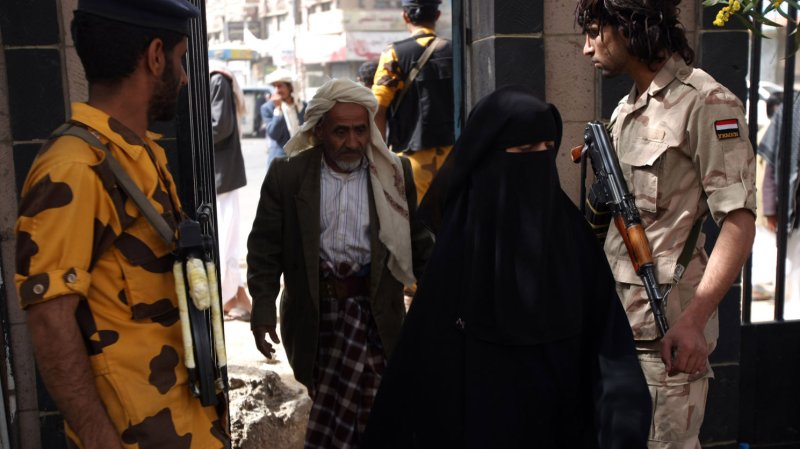Yemeni soldiers stand guard as Yemenis wait to cast their votes during the presidential elections at a polling center in Sanaa, Yemen on February 21, 2012. UPI/Mohammad Abdullah |
License Photo
SANAA, Yemen, July 5 (UPI) -- As Yemen's military, backed by U.S. Special Forces and the CIA, drive al-Qaida forces out of their southern strongholds, Saudi Arabia's intelligence agents, old hands at operating in Yemen, are playing a vital clandestine role.
Few outside Yemen appreciate the extent to which oil-rich Saudi Arabia has been able over the years to influence, even dominate, events in its troublesome and impoverished neighbor that lies at the southwestern tip of the Arabian Peninsula.
The kingdom's principal intelligence services, the General Security Service, the internal security agency run by the Interior Ministry, and the General Intelligence Presidency, the external spy service headed by Prince Muqrin bin Abdul Aziz, have been operating in Yemen for years through unrivalled networks.
But the GSS's counter-terrorism unit headed by Prince Mohammed bin Nayef, son of the late interior minister, Crown Prince Nayef, who died in June, is the lead service in the battle against al-Qaida in the Arabian Peninsula, the jihadist organization in Yemen.
"The Saudis have a special position in Yemen," observed Mustafa Alani of the Gulf Research Center in Dubai, United Arab Emirates.
"They can do what the Americans cannot do. They understand the culture and they provide the human intelligence, which is the crucial and dangerous part."
According to diplomatic sources, Saudi intelligence, with unlimited funds spread among sympathetic Yemeni clans like the Hashed and the al-Ahmar, runs a network of some 30,000 agents and informants in regions where AQAP operates.
The Americans prefer to work with the Saudis rather than Yemen's security services, which have been thoroughly penetrated by AQAP.
That means Saudi agents have been able to infiltrate AQAP. These penetrations have paid off several times with the GSS or GIP warning the Americans of al-Qaida plots or pinpointing key jihadist leaders for U.S. airstrikes.
Their most recent success came in May. An undercover Saudi agent who had penetrated AQAP so deeply he was entrusted with a suicide mission alerted the Americans to a plot to blow up a U.S. airliner with a non-metallic bomb.
The agent was a British citizen, possibly of Saudi origin. The Saudis also got their hands on AQAP's latest bomb design, a major breakthrough.
The highly sensitive operation was leaked by the U.S. administration, apparently to make political capital in the run-up to the November presidential election.
That caused great dismay in the Saudi intelligence establishment and Britain's SIS, who felt the administration compromised ultra-secret undercover operations against al-Qaida for domestic political gain.
The Saudi double agent was also responsible for fingering Fahd Mohammed Ahmed Quso, 37, AQAP's operations chief.
Quso was killed in a May 6 CIA drone strike as he stepped out his car in a remote valley in south Yemen's Shabwa province.
He had a $5 million U.S. bounty on his head and was on the FBI's most-wanted list for involvement in the Oct. 12, 2000, bombing of the missile destroyer USS Cole in Aden harbor that killed 17 U.S. sailors.
Saudi agents had been instrumental in exposing two other AQAP operations to blow up U.S. aircraft -- the Christmas Day 2009 plot to blow up a U.S. airliner over Detroit and an October 2010 plot in which bombs were hidden in printer cartridges aboard U.S.-bound FedEx and UPS jets.
The Saudis have operated clandestinely in their turbulent and more populous southern neighbor for many years, either to destabilize it or contain its violent tribal politics.
But the Saudi war against AQAP is more sharply, and lethally, focused.
AQAP's leadership and hardcore operations chiefs are largely Saudis who fled the kingdom during Prince Mohammed's successful campaign against al-Qaida in 2003-06.
Twenty-six of Saudi Arabia's 85 most wanted terrorist fugitives are currently in Yemen.
Mohammed was the target of an AQAP assassination attempt Aug. 27, 2009, that involved two Saudi brothers.
The 23-year-old AQAP suicide bomber was Abdullah al-Asiri, who's on Riyadh's most-wanted list.
He used an underwear bomb, the first of several employed by AQAP since 2009, constructed by his brother Ibrahim, the bomb maker behind the three airline plots.
The attack in Mohammed's palace in the Red Sea port of Jeddah failed. The prince was only wounded. The bomber was killed.
But that was the closest al-Qaida has ever come to murdering a member of the House of al-Saud and was seen as a major escalation in al-Qaida's renewed operations against the kingdom.





